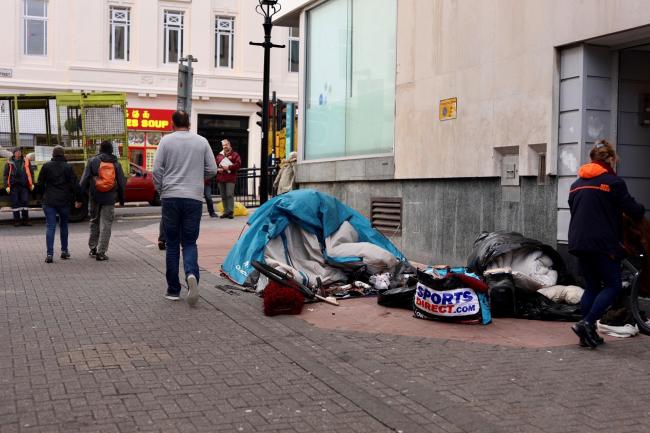
A HOMELESS couple living in a tent in the centre of Brighton have been removed after months of complaints.
Kieran Spiteri, 34, and Bernice Howley, 41, set up camp in Duke Street almost six months ago.
Traders complained they were bad for business and some threatened not to pay their council tax until the tent was removed.
Shop owner Helly Parker said: “It’s affecting business and people do not want to come to a city where every corner you’re tripping over homeless people.”
This morning the city council handed them a notice telling them to remove their tent and belongings.
Pictures show the couple helping council staff load an old sofa and other items into a refuse truck.
And their distinctive blue tent was later removed.

Ebony James-Kent, 21, who works at Rendezvous Tea House in Duke Street said everyone on the street watched as the couple loaded their belongings into the council truck.
She said: “We didn’t make any complaints but all of the businesses on the street wanted them gone.
“For us, it wasn’t very nice for people when they wanted to sit outside to eat.”
Another shop owner, who asked not to be named, said: “I would like the council to send someone to wash the area they were on as it’s very dirty and you don’t know what went on there.”
Photographer Oli Lyons, 34, from Hanover took these pictures.
He said: "The couple looked upset but there weren’t any signs of a struggle."

Brighton and Hove City Council said: "The council has taken action to remove a large tent in Duke Street. The move follows a meeting with local businesses in the city centre of Brighton where traders expressed concerns about anti-social behaviour and obstruction to the highway.
“Any action to move a tent is taken with consideration for those staying there. Living in a tent in a busy city centre is dangerous. The council and partners have made provision for overnight shelters during the winter. A range of public and voluntary sector agencies also provide co-ordinated outreach support to people suffering from physical health, mental health and substance abuse problems.
“We will continue to help and support those in need. At the same time the council has a duty of care to all its residents, businesses and visitors and we will act where anti-social behaviour and obstruction to the highway becomes a significant issue for the city.”
Councillor Clare Moonan, responsible for rough sleeping, said: "My main aim is always to offer support to rough sleepers and to help them off the streets as soon as possible. This might be in the city if they are local or helping them to return back home where there are services available for them if more appropriate.

"This approach is working and the number of rough sleepers in the city is reducing. There’s always more we can do and we’re working with our partners to help those in need.
"Living in a tent in the city centre is not a sustainable way of life.
"It also puts people at risk of being exploited by those responsible for anti-social and criminal behaviour.
"Our services encourage rough sleepers to pack up their belongings during the day and come into one of the drop in services where they can get food and meet their support workers.
Lisa Bell, chief superintendent of Sussex Police, said: "Police are supportive of the action being taken as there is a continued focus on supportive interventions to help people off of the streets.
"As always, there is a need to strike a sensible balance between enforcement, diversion and the rights of people to run their businesses or go about their daily lives without the risk of encountering anti- social behaviour.
"We recognise the importance of supporting those who may be vulnerable, whilst ensuring that the law is applied sensitively and when necessary.
"This is another positive example of the police and local authority and other partners working together to keep people safe."
 Council staff help the couple remove their belongings from Duke Street
Council staff help the couple remove their belongings from Duke Street
Kathleen Sims, St Mungo’s rough sleeping services development manager in Brighton & Hove, said:
"Rough sleeping is harmful, dangerous and dehumanising for people.
"The average age of death for someone who dies while homeless is 47 for a man, 43 for a woman. Our outreach teams follow up referrals of anyone sleeping rough to support people away from the streets into safer accommodation, better health and so people can move on with their lives and fulfil their hopes and ambitions.
"We don’t want anyone to be out on the streets and, with winter approaching and additional night shelter provision set to open, we are working hard to make sure no one is left out in the cold."



Comments: Our rules
We want our comments to be a lively and valuable part of our community - a place where readers can debate and engage with the most important local issues. The ability to comment on our stories is a privilege, not a right, however, and that privilege may be withdrawn if it is abused or misused.
Please report any comments that break our rules.
Read the rules hereLast Updated:
Report this comment Cancel